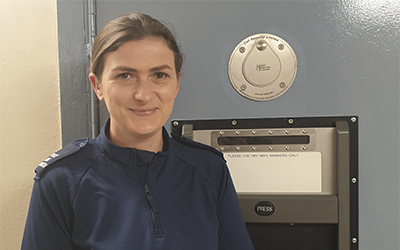Meet… Detention Officer Beth Harrison

Role: Detention Officer Delivery Manager
Age: 30
Length of Service: 7 years in total – I worked as a Detention Officer (DO) for 2 years then progressed to supervisor and Lead DO before becoming Detention Officer Delivery Manager.
Previous Career: I worked in IRB (International Research Bureau) but I wasn’t passionate about it so I started working in bar work, but one of my friends introduced me to the idea of a DO. I’d always been interested in the police because it’s a lifelong career.
Main transferable skills: Being able to talk to people is a key quality, it’s the difference between aggravating a potentially violent situation to calming individuals down and finding out what is really going on so that we can help them. You need to be open and build rapport – we have detainees in our care for days sometimes, so they have to put their trust in us, knowing that we’re here to look after them and their welfare – we will listen and help them in any way possible. You need to be someone that can say ‘I’m only human too’.
Progression: With Thames Valley Police you can progress and people see your potential, since becoming a DO I’ve worked at the G8 summit and on various projects, it also opens up other doors and avenues within the police where you can really develop yourself.
Best thing about your job: It’s both the help we can give and the environment we work in. We work very closely with officers from all ranks and I’m contributing towards the police, victims and law, but I also get to help other people and get them the right services they need. You get to make a real difference and have pride in where you work.
You become part of the TVP family, we’re very close knit, your team will always be there to support you and to help you in challenging situations.
Most challenging thing: Peoples idea of the role is challenging because they think we put someone in a cell and get up and leave but there is a lot more to it – beyond the certain checks and conduct that we have to do at all times, people don’t realise how much responsibility we hold, and the detainees can be challenging, both physically and mentally, but it is so rewarding when you adapt to their needs and really help them.
Advice: Go in with an open mind and tell yourself that you can do it. I was shy at first and after the course I just moulded and found a confident side of me. You deal with so many people and find out so much, an open mind is vital. Have total empathy and try to be as understanding as possible – I try to treat everyone the way I would hope my family would be treated if they were ever in that situation. You have to be adaptable; you never know what each day will bring – but that’s the great thing, it can be really fast paced and there is just so much variety.


 Facebook
Facebook
 Twitter
Twitter
 Linkedin
Linkedin
 Instagram
Instagram